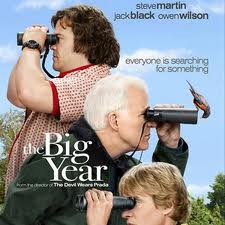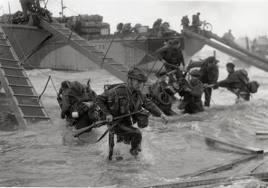 Spoiler Alert: This post is about the recent movie The Big Year starring Steve Martin, Jack Black, and Owen Wilson. If you want to see it, reading further could ruin it for you. I thought it was a pretty good movie, however, our American viewing audiences might not agree. This movie does not have copious amounts of violence, sex, or action other than obsessed men on the hunt in competition to view the most species of birds in one year. Three disparate men, each facing unique personal and relational challenges, try to outdo each other in the ultimate bird-watching competition.
Spoiler Alert: This post is about the recent movie The Big Year starring Steve Martin, Jack Black, and Owen Wilson. If you want to see it, reading further could ruin it for you. I thought it was a pretty good movie, however, our American viewing audiences might not agree. This movie does not have copious amounts of violence, sex, or action other than obsessed men on the hunt in competition to view the most species of birds in one year. Three disparate men, each facing unique personal and relational challenges, try to outdo each other in the ultimate bird-watching competition.
I watched the plot unfold on how each man’s obsession affected their love lives, familial relationships, and their relationships with each other. I found my mind wandering to the parallels of those I treat with sex addiction. Three men obsessed, hunting, searching and driven. Each has a back story which shapes their quest. Steve Martin’s character is driven, achieved success, but has not quelled the need to continue to search for fulfillment and drive. Owen Wilson’s character has reached the title once in his life, but can’t let another man beat him this year. The El Nino winds have made weather patterns hold promise that he could beat his own record! He can’t resist the temptation to better his own ultimate peak experience. He fails to make good on promises to his wife and the infertility clinic schedule for the bird viewing obsession. Jack Black’s character hopes to escape his doldrums of 9-5 existence. He is stuck in the rut of discordant family relations. He has an unsupportive father who has not realized his own life’s potential. Jack longs for a life of passion in any form. The disrespecting father is void of his own life’s passion and ridicules his son for these crazy efforts. The big year could be Jack Black’s big break at the chance to heal all his psychic ills.
Sex addiction is a disease that hides. Many who struggle with the addiction report a feeling of doctor Jekyll and Mr. Hyde. I watched the movie with interest as conquest, compulsion, and secrecy affected the characters' family relationships and their relationships with one another. Each man in competition with the other tries to hide their true motives from one another. This act of secrecy shapes their relationships, as well. We watch secrecy shape their relations with one another and their primary relationships. And so it is with sex addiction.
I watched the movie with interest as conquest, compulsion, and secrecy affected the characters' family relationships and their relationships with one another. Each man in competition with the other tries to hide their true motives from one another. This act of secrecy shapes their relationships, as well. We watch secrecy shape their relations with one another and their primary relationships. And so it is with sex addiction.
Sex addiction is an intimacy disorder and leads to a life out of balance. Steve Martin, restless for more achievement, is transparent to his wife about his goals for The Big Year. His obsession drives him, yet, his wife can support him because she recognizes the importance to him. She encourages him to follow his dreams. His corporate staff is frustrated for the inability to reach him through this obsession. Steve Martin also appears nurturing to Jack Black’s character, yet hides his true motives from him. Jack Black, endearing himself to this father figure on his journey, is honest about his intentions for The Big Year and feels betrayed when he finds out Steve Martin has hid the truth about his intentions for The Big Year. Owen Wilson promises to meet his wife and her needs of a baby which involves scheduled infertility treatments. The obsession for the call of the birds is greater than the biologic clock that ticks away within his wife. Owen and his wife are single-minded and self-obsessed. They ignore, or fail to recognize, what the passion is within one another. They live in parallel focused environments frustrated for the other’s inability to meet their needs. A similar dynamic often exists in the sex-addicted marriage.
Sex addiction is a family of origin disorder. Jack Black lives in a home enmeshed with his mother and a father who fails to recognize either his wife’s or his son’s emotional processes, let alone his own! The mom overextends herself to her son’s wishes almost to make up for her husband’s criticism and disengagement.
Obsession kills relationships. As Terry Real presented at the recent SASH conference I attended, “The ‘cure’ for addiction and emotional problems is emotional connection. We hide our true selves in addiction fearing we would be unlovable. Intimacy (into-me-you-see intimacy) is the fix for addiction. Steve Martin, supported in understanding, comes to understand what his obsession is costing him as his first grandchild is born. He realizes the obsession is keeping him from the ones he loves. Jack Black’s father meets an-end-of-life-health crisis head on. Faced with his immortality, the crisis wakes him up to the importance of life. In this crisis he and his son begin to learn caring and a shared intimacy. He even goes out with his son on his quest for the elusive Great Gray Owl. Jack Black in his obsession, but feeling cared for, realizes he neglected to care for his ailing father. He panics thinking his father might have a heart attack and circles back to find him- a brilliant metaphor. Not only does he find his father, but he finds his father has found the elusive thing that he seeks – the Great Gray Owl. Intimacy is created over time by shared experiences.
In the end, Jack Black healed with his dad’s love and respect, is freed up to be truly intimate with others in his life. His opportunity for love, previously elusive, appears and he is ready to take it. Owen Wilson misses the chance to meet the need of his wife one more time. She can no longer endure the rejection and they both cannot turn off their respective obsessions or resentments for each other. Steve Martin and Jack Black, feeling healed in their life and relationships, hope that Owen Wilson can live with the choices he makes and the consequences of his actions.
I sat with a man recently who attempted to reach his father his whole life. When all was revealed about this father’s obsession and addiction, the father said to his son I do not want to give up what I am doing. It is a painful realization when one knows they are picked over for the addiction. Some people choose to remain isolated and die “in their disease”. Some realize what is important. Some choose the hard work of intimacy and connection. Steve Martin and Jack Black demonstrated the rewards of a connected life with the decision to live consciously and it was heartwarming.
 My thoughts entered the realm of “stinking thinking” and the dreaded “I can’t do this”. Ughhh. I was tired. I was alone. I didn’t have my music. I was becoming bored. All the tell-tale signs of the wheels falling off the bus were at-risk for coming into play.
My thoughts entered the realm of “stinking thinking” and the dreaded “I can’t do this”. Ughhh. I was tired. I was alone. I didn’t have my music. I was becoming bored. All the tell-tale signs of the wheels falling off the bus were at-risk for coming into play.  Bringing my mind to the present gave me presence of mind. Just for this week I am on task. Just until the leaf and the crack in the asphalt, I can do this. What a gift!
Bringing my mind to the present gave me presence of mind. Just for this week I am on task. Just until the leaf and the crack in the asphalt, I can do this. What a gift! Oh my, this was not in the plan! I turned to see that I could no longer see the horizon and could only see what felt like a wall of water coming towards us! We knew that we had to face into the direction of the swell to keep from being toppled. Thankfully we were able to maneuver properly. Along came another large swell that prevented us from seeing the horizon. It was so tall if felt as if it would break over top of us. For me, this was very frightening. I didn’t panic, but I found myself going through a protocol of water safety “what if” scenarios in my head. A third very large swell came along. I thought my husband would better know how to take care of himself than I would if we toppled, but I am sure I could make it, but there was a lot of trepidation!
Oh my, this was not in the plan! I turned to see that I could no longer see the horizon and could only see what felt like a wall of water coming towards us! We knew that we had to face into the direction of the swell to keep from being toppled. Thankfully we were able to maneuver properly. Along came another large swell that prevented us from seeing the horizon. It was so tall if felt as if it would break over top of us. For me, this was very frightening. I didn’t panic, but I found myself going through a protocol of water safety “what if” scenarios in my head. A third very large swell came along. I thought my husband would better know how to take care of himself than I would if we toppled, but I am sure I could make it, but there was a lot of trepidation!
 I watched the movie with interest as conquest, compulsion, and secrecy affected the characters' family relationships and their relationships with one another. Each man in competition with the other tries to hide their true motives from one another. This act of secrecy shapes their relationships, as well. We watch secrecy shape their relations with one another and their primary relationships. And so it is with sex addiction.
I watched the movie with interest as conquest, compulsion, and secrecy affected the characters' family relationships and their relationships with one another. Each man in competition with the other tries to hide their true motives from one another. This act of secrecy shapes their relationships, as well. We watch secrecy shape their relations with one another and their primary relationships. And so it is with sex addiction.
 Life, as they knew or thought it to be, changes in an instant. PTSD from the trauma continues as they lose so much in the transaction of the discovery invasion. The spouse of the addict loses their way, their orientation to life, and the things they thought that were, aren’t. They lose the feelings of specialness to their spouse that was felt in the marriage. It is a betrayal like no other. For the addict there are casualties, as well. The addict is often caught by a surprise attack. They are left to defend the territory of addiction. They are lost in a world of disorientation from the occupation of the addiction and the shame of being discovered. It is a difficult labyrinth for both sides of the war at this point. I have both spouses and addicts contact me in the aftermath of discovery. I can assure you it is painful and the wounds are severe for both soldiers in the opposing armies.
Life, as they knew or thought it to be, changes in an instant. PTSD from the trauma continues as they lose so much in the transaction of the discovery invasion. The spouse of the addict loses their way, their orientation to life, and the things they thought that were, aren’t. They lose the feelings of specialness to their spouse that was felt in the marriage. It is a betrayal like no other. For the addict there are casualties, as well. The addict is often caught by a surprise attack. They are left to defend the territory of addiction. They are lost in a world of disorientation from the occupation of the addiction and the shame of being discovered. It is a difficult labyrinth for both sides of the war at this point. I have both spouses and addicts contact me in the aftermath of discovery. I can assure you it is painful and the wounds are severe for both soldiers in the opposing armies. Disclosure is not just coming clean in confession after the discovery. Disclosure must be planned and executed as carefully as the Normandy Invasion was planned for. To haphazardly just rush in could be disastrous for the campaign of winning the war. Disclosure should be done purposefully with the skill of trained therapists with experience of how to structure disclosure for the maximum chance of success.
Disclosure is not just coming clean in confession after the discovery. Disclosure must be planned and executed as carefully as the Normandy Invasion was planned for. To haphazardly just rush in could be disastrous for the campaign of winning the war. Disclosure should be done purposefully with the skill of trained therapists with experience of how to structure disclosure for the maximum chance of success. 

